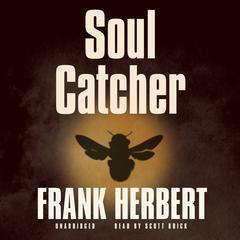 Play Audiobook Sample
Play Audiobook Sample
The Green Brain Audiobook
 Play Audiobook Sample
Play Audiobook Sample
Quick Stats About this Audiobook
Total Audiobook Chapters:
Longest Chapter Length:
Shortest Chapter Length:
Average Chapter Length:
Audiobooks by this Author:
Publisher Description
In an overpopulated world seeking living room in the jungles, the International Ecological Organization was systematically exterminating the voracious insects that made these areas uninhabitable. Using deadly foamal bombs and newly developed vibration weapons, men like Joao Martinho and his coworkers fought to clear the green hell of the Mato Grosso.
But somehow those areas that had been completely cleared were becoming reinfested, despite the impenetrable vibration barriers. And tales were coming out of the jungles—tales of insects mutated to incredible sizes, of creatures who seemed to be men but whose eyes gleamed with the chitinous sheen of insects...
Download and start listening now!
"Frank Herbert is an excellent writer; i learned the fusion of small bugs into not simply big bugs but anything and everything, will help not just the radiated and pesticide-ridden "future" South America, but also save a dude's life who was shot in the chest. "
— Anastasia (5 out of 5 stars)
Quotes
-
“Herbert does more than carry events forward: he deals with the consequences of events, the implications of decisions.”
— St. Louis Post-Dispatch
The Green Brain Listener Reviews
- — Jan Knaup, 12/2/2021
-
" It is Herbert, but stripped down to the point of uselessness. Only read this if you're a completist. "
— Will, 8/9/2010 -
" Interesting book! It wasn't that amazing or unusual, but short and fun! "
— Emma, 8/3/2010 -
" Entertaining scifi about a conflict between an insect hive brain and a civilization trying to eradicate all insects in Brazil. Pretty decent character development. Three stars. "
— Dylan, 6/15/2010 -
" If humans wanted to eradicate inverts, this is probably what would happen... "
— Aaron, 6/8/2010 -
" Another great story from Herbert. Riveting the whole way through...and the ending blew me away, I remember. Gonna relive this one again soon. "
— Samuel, 10/2/2009 -
" Frank Herbert has written better. This is only good if you're looking for something shorter, more manageable, and less engrossing than his better books. "
— Nathaniel, 7/15/2009 -
" It amazes me that the author of the Dune series could have written this. The concept of the book is good, but it is poorly developed, seemingly rushed. Given that Herbert is known for his full engulfing worlds I know he can do better than this! "
— Raven, 6/21/2008 -
" harmless drivel. <br/> <br/>Misplaced eco-rabble. <br/> <br/>Still ahead of his time as an environmentalist, this one just doesn't work though. "
— Karl, 1/11/2008 -
" Another interesting take on the human-ecology symbiosis, a very common theme in many, if not all, of Herbert's works. It was a quick read, only 200 pages, but worth it if you are a Herbert fan. It gives some more insight to his philosophies. Probably not recommended for a one-off read, though. "
— Chris, 12/30/2007
About Frank Herbert
Frank Herbert (1920–1986), winner of the Hugo and Nebula awards and a #1 New York Times bestselling author, was born in Tacoma, Washington, and worked as a reporter and later as an editor for a number of West Coast newspapers before becoming a full-time writer. His first science fiction story was published in 1952, but he achieved fame more than ten years later with the publication of “Dune World” and “The Prophet of Dune” in Analog. The stories were amalgamated in the bestselling novel Dune in 1965.
About Scott Brick
Scott Brick, an acclaimed voice artist, screenwriter, and actor, has performed on film, television, and radio. He attended UCLA and spent ten years in a traveling Shakespeare company. Passionate about the spoken word, he has narrated a wide variety of audiobooks. winning won more than fifty AudioFile Earphones Awards and several of the prestigious Audie Awards. He was named a Golden Voice by AudioFile magazine and the Voice of Choice for 2016 by Booklist magazine.
























